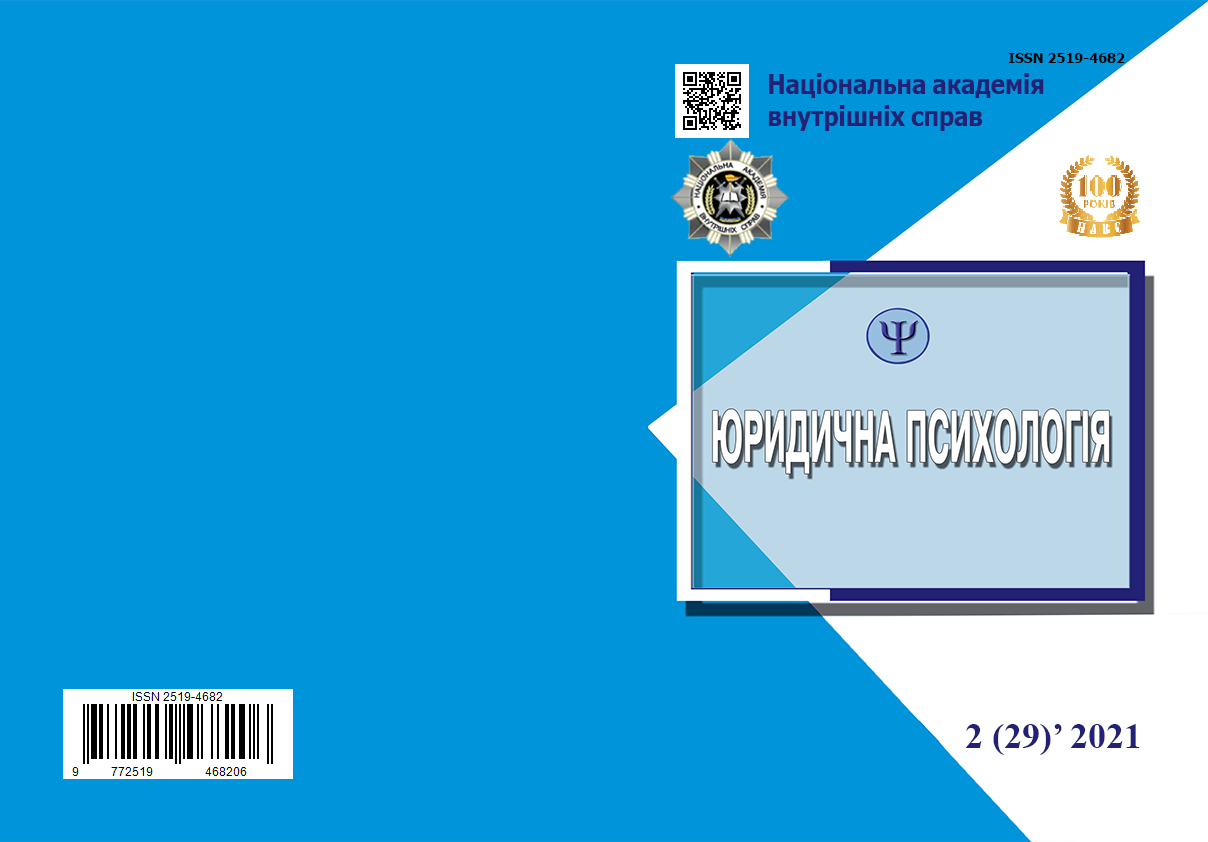Interrogation of a Juvenile: Forensic and Psychological Characteristics
Abstract
The purpose of the article is to clarify the peculiarities of the interrogation of minors in criminal proceedings for criminal offenses and to provide its forensic and psychological characteristics. The task is to form a system of tactics that will help establish psychological contact with a minor interrogated, neutralize conflict situations, help prevent good faith errors in the testimony of the interrogated. Methodology. Methodological tools are a system of general scientific and special legal methods of cognition. The scientific novelty lies in the formation of forensic and psychological characteristics of the interrogation of minors in criminal proceedings for criminal offenses. It is substantiated that the interrogation of a juvenile is a procedurally and tactically complex investigative (search) action, for which the coroner must carefully prepare. It is necessary to establish psychological contact with a minor, conduct an interrogation in the form of dialogue, a confidential conversation. Conclusions. The investigation of criminal offenses in some cases is accompanied by conflicts between the investigator and the juvenile suspect. Juvenile interrogators often have difficulty reproducing the circumstances of a criminal offense, which leads to the emergence of good faith errors in testimony. According to the content of the article, these two problem situations are solved and algorithms for their solution are proposed. It is concluded that from the point of view of criminology, the interrogation of a juvenile in criminal proceedings for criminal offenses is an investigative (search) action, the content of which is to obtain and record in the prescribed form testimony containing information relevant to criminal proceedings. From the point of view of psychology, the interrogation of a juvenile in criminal proceedings for criminal offenses is a process of specific communication between the investigator and the participant in the criminal proceedings.
Keywords: interrogation; criminal proceedings; criminal offense; coroner; tactics; psychological contact.
Downloads
References
Досудове розслідування кримінальних проступків : метод. рек. / [С. С. Чернявський, М. С. Цуцкірідзе, Р. М. Дударець та ін.]. Київ : Нац. акад. внутр. справ, 2019. 160 с.
Чорноус Ю. М. Психологічні основи реалізації тактичних прийомів. Юридична психологія. 2020. № 1 (26). С. 13–22. doi: https://doi.org/10.33270/03202601.13.
Филонов Л. Б. Психологический контакт педагога и учащегося как условие успешной профилактики отклонений в поведении. Психологическая профилактика недисциплинированного поведения. 1989. С. 238–251.
Ковбаса В. М. Актуальні питання тактичного забезпечення допиту неповнолітніх. Науковий вісник Дніпропетровського державного університету внутрішніх справ. 2014. № 1. С. 253–258.
Кримінальний процесуальний кодекс України : Закон України від 13 квіт. 2012 р. № 4651-VI. URL: http://zakon2.rada.gov.ua/laws/show/4651-17.
Никандров В. В. Наблюдение и эксперимент в психологии : учеб. пособие. СПб. : Речь, 2002. 103 с.
Осипенко І. П., Пророченко В. В. Використання можливостей невербальної інформації у розслідуванні злочинів. Юридичний науковий електронний журнал. 2019. № 6. С. 392–395. doi: https://doi.org/10.32782/2524-0374/2019-6/94.
Панасенко Е. Експеримент як провідний емпіричний метод наукового дослідження в психології: теоретичний аспект. Науковий вісник Миколаївського національного педагогічного університету імені В. О. Сухомлинського. 2017. № 1 (17). С. 127–133. (Серія «Психологічні науки»). URL: http://mdu.edu.ua/wp-content/uploads/psihol-visnik-17-2017-24.pdf.
Pletenets V., Kurganova D. Typical conflict situations when covering and ways of their solution. Visegrad Journal on Human Rights. 2019. No. 3 (1). Р. 219–222. URL: https://journals.indexcopernicus.com/api/file/viewByFileId/903456.pdf.
Выготский Л. С. Развитие высших психических функций. М. : АПН СССР, 1960. 450 с.
Єфімов М. М. Особливості встановлення психологічного контакту при проведенні допиту під час розслідування злочинів проти моральності. Науковий вісник Дніпропетровського державного університету внутрішніх справ. 2020. № 1. С. 200–204. doi: 10.31733/2078-3566-2020-1-200-204.
Abstract views: 283 PDF Downloads: 670
- Authors reserve the right to authorship of their own work and transfer to the magazine the right of the first publication of this work under the terms of the Creative Commons Attribution License, which allows other persons to freely distribute published work with mandatory reference to authors of the original work and the first publication of an article in this magazine.
- Authors have the right to enter into separate additional agreements on non-exclusive dissemination of the work in the form in which it was published in the journal (for example, to post an article in the institution's repository or to publish as part of a monograph), provided that the link to the first publication of the work in this journal is maintained.
- The journal's policy allows and encourages the posting of articles by authors on the Internet (for example, in electronic storehouses of institutions or on personal websites), both before the submission of this manuscript to the editorial office and during its editorial processing, as this contributes to the creation of a productive scientific discussion and positively affects the efficiency and dynamics of citing the published work.




